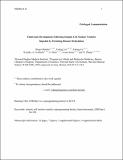| dc.contributor.author | Matoba, Shogo | |
| dc.contributor.author | Liu, Yuting | |
| dc.contributor.author | Lu, Falong | |
| dc.contributor.author | Iwabuchi, Kumiko A | |
| dc.contributor.author | Inoue, Azusa | |
| dc.contributor.author | Zhang, Yi | |
| dc.date.accessioned | 2014-12-17T21:08:37Z | |
| dc.date.issued | 2014 | |
| dc.identifier | Quick submit: 2014-10-03T10:26:07-04:00 | |
| dc.identifier.citation | Matoba, Shogo, Yuting Liu, Falong Lu, Kumiko A. Iwabuchi, Li Shen, Azusa Inoue, and Yi Zhang. 2014. “Embryonic Development Following Somatic Cell Nuclear Transfer Impeded by Persisting Histone Methylation.” Cell 159 (4) (November): 884–895. doi:10.1016/j.cell.2014.09.055. | en_US |
| dc.identifier.issn | 0092-8674 | en_US |
| dc.identifier.uri | http://nrs.harvard.edu/urn-3:HUL.InstRepos:13548984 | |
| dc.description.abstract | Mammalian oocytes can reprogram somatic cells into a totipotent state enabling animal cloning through somatic cell nuclear transfer (SCNT). However, the majority of SCNT embryos fail to develop to term due to undefined reprogramming defects. Here we identify histone H3 lysine 9 trimethylation (H3K9me3) of donor cell genome as a major epigenetic barrier for efficient reprogramming by SCNT. Comparative transcriptome analysis identified reprogramming resistant regions (RRRs) that are expressed normally at 2-cell mouse embryos generated by IVF but not SCNT. RRRs are enriched for H3K9me3 in donor somatic cells, and its removal by ectopic expression of the H3K9me3 demethylase Kdm4d not only reactivates the majority of RRRs, but also greatly improves SCNT efficiency. Furthermore, use of donor somatic nuclei depleted of H3K9 methyltransferases markedly improves SCNT efficiency. Our study thus identifies H3K9me3 as a critical epigenetic barrier in SCNT-mediated reprogramming and provides a promising approach for improving mammalian cloning efficiency. | en_US |
| dc.language.iso | en_US | en_US |
| dc.publisher | Elsevier BV | en_US |
| dc.relation.isversionof | doi:10.1016/j.cell.2014.09.055 | en_US |
| dash.license | OAP | |
| dc.subject | somatic cell nuclear transfer | en_US |
| dc.subject | reprogramming barrier | en_US |
| dc.subject | heterochromatin | en_US |
| dc.subject | H3K9me3 | en_US |
| dc.subject | Suv39h | en_US |
| dc.title | Embryonic Development following Somatic Cell Nuclear Transfer Impeded by Persisting Histone Methylation | en_US |
| dc.type | Journal Article | en_US |
| dc.date.updated | 2014-10-03T14:26:08Z | |
| dc.description.version | Accepted Manuscript | en_US |
| dc.rights.holder | Shogo Matoba, Yuting Liu, Falong Lu, Kumiko A. Iwabuchi, Li Shen, Azusa Inoue, and Yi Zhang | |
| dc.relation.journal | Cell | en_US |
| dash.depositing.author | Zhang, Yi | |
| dc.date.available | 2014-12-17T21:08:37Z | |
| dc.identifier.doi | 10.1016/j.cell.2014.09.055 | * |
| dash.contributor.affiliated | Iwabuchi, Kumiko A | |
| dash.contributor.affiliated | Lu, Falong | |
| dash.contributor.affiliated | MATOBA, Shogo | |
| dash.contributor.affiliated | Liu, Yuting | |
| dash.contributor.affiliated | Inoue, Azusa | |
| dash.contributor.affiliated | Zhang, Yi | |


